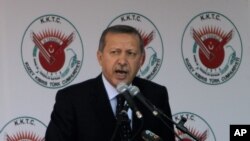Turkey's Prime Minister Tayyip Erdogan, warned on Wednesday that his country's relations with the European Union "will be completely frozen" if Cyprus assumes the bloc's presidency before a deal reunifying the ethnically split island is reached. The threat is part of what is seen as a tough new approach to both the EU and Cyprus by the prime minister.
Erdogan's took the opportunity to toughen his stance while on a two-day visit to the Turkish area of Northern Cyprus to mark he 37th anniversary of Turkey's invasion of the island.
Despite repeated UN efforts, Cyprus remains firmly divided since Turkey's 1974 invasion in response to a Greek inspired coup. Addressing the ceremony Erdogan warned time is running out for reunification efforts.
"Everyone should know the existing window of opportunity on Cyprus will not always be open, he said. The North Cyprus Turkish side is working for peace and solutions against all injustices. It’s not bearable anymore," Ergogan said.
The prime minister also announced that Ankara would be withdrawing all concessions made over the failed 2004 UN-sponsored plan. Under the terms of the deal, Turkish Cypriots voted for reunification; Greek Cypriots voted against it.
The concessions form the basis of current UN efforts to reunite the island, which observers say are already floundering.
Ioannis Grigoriadis, at Ankara's Bilkent University, says Erdogan's statements provoked anger and shock from the Greek cypriots.
"This latest statements won't help at all attempts to revive the negotiation process on the island. There was widespread belief in the Republic in Cyprus and in Greece that following the election Erdogan might have been in position to come forward with a more moderate stance related to the Cyprus issue and they hoped to revitalize the negotiation process," Grigoriadis said.
Richard Howitt, spokesman on Turkish affairs for the socialist bloc in the European Parliament, warns such threats could be counterproductive for Ankara.
"It's of course not going to be helpful, to get into the situation where there are threats of closing down communication. Because there are too many people on the European side who actually will see that as an opportunity rather than a threat. I don't want to give succor to opponents of Turkey who would be very pleased see Turkey itself freeze negotiations and might to seek to exploit that to try seek to suspend or close negotiations down," Howitt said.
Turkey began formal talks on joining the EU in 2005 but is frustrated by the slow progress made so far. Aside from Cyprus, opposition from France and Germany has brought Turkey's EU accession to a virtual halt. But with Turkey becoming a regional economic and political powerhouse with currently the fastest growing economy in Europe, threats from the EU carry less weight.
Mr. Erdogan has warned the EU that if the island is not reunited by next year, Turkey will go it alone. That is being interpreted by analysts as Ankara using its growing economic and political power to seek international recognition for the Turkish Cypriots as an independent state. Currently only Turkey recognizes the Turkish Cypriot government.
But Political scientist Cengiz Aktar at Istanbul's Bahcesehir University says such a move could further hamper Turkey’s EU bid.
"That might have very very serious consequences. The EU [would] need to consider its negotiating stance with Turkey. After all it would be annexing EU territory," Aktar said.
But senior Turkish diplomats and politicians have repeatedly warned that current UN talks provide the last chance to efforts to reunite Cyprus. That has until now been widely treated as mere Turkish rhetoric. Now, Erdogan seems more determined than ever that issue of the divided island of Cyprus will be resolved one way or another in the next few months.
Turkey's PM Warns Against Cyprus EU Presidency




